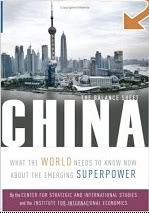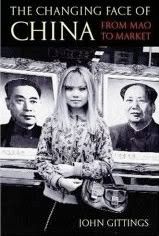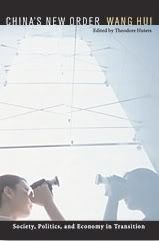Is the Evolution of China favorable to the Third World?
Is the evolution of China favorable to the Third World?
The Cuban leader Fidel Castro said three weeks ago: "Thanks to China and Venezuela, we are in good way to resolve the crisis that appeared in our country after the collapse of the Soviet Union in 1991." Until 1991, the trade of Cuba was centered on the Soviet Union and the Eastern bloc. When these trade partners abruptly disappeared, the Cuban economy was trapped in a deep hole. Today, it has emerged from it, says Castro. Thanks to Venezuela for sure, since Venezuela is an important oil producer and Cuba needs oil. But, thanks to China? What does China have to offer in that area? And if China has such a positive influence on Cuba, is this the case for other Third World countries? Let us examine the subject a little closer.
Peter Franssen
27-04-2005
A Good Wind from the East
These eight last years, Chinese trade has had an average growth of 16% per year. Each year, more and more products are exported from China, and the country also imports more and more products. The rise in trade means growth for the economy.
Specialists say it today: their trade with China accounts for almost half of the economic growth of the countries of Asia. Not only Asia, but the whole world gains from this. In a detailed study of the Chinese economy, a researcher from the International Monetary Fund draws the following conclusion: "During the period 2001-2003, 24% of the growth of the world economy was due to China."1
Castro Neves, Brazil's ambassador to China, declared during a recent conference: "In 2003, our economy had zero growth. We did not progress, but, fortunately, did not regress either. Without China, we would have regressed almost 1%."2 In Brazil, the largest country of South America, where 185 million inhabitants live, this 1% represent the difference between suffering from the famine and have enough to eat for hundreds of thousands of people.
At the beginning of this year, Chinese president Hu Jintao carried out a tour in South America. On that occasion, Venezuelan President Hugo Chavez stated: "China came to Latin America like a sister. China reached out a hand in friendship toward those who needed it most."3 You would have to look for a very a long time in South America to find somebody who says the same thing in connection with the United States and of President Bush.
A few weeks ago, the Nigerian President Olusegun Obasanjo, who also chairs the African Union, was visiting China and declared: "The African countries try to learn from China. They see China lighting the way ahead for their own development."4
In Latin America, in Asia and Africa, China enjoys increasing prestige. The economic bonds between China and dozens of Third World countries result in collaborative agreements that go much further than the simple economic ground. In the Third World, one sees a united front congealing that is breaking the suffocating influence of the United States.
China is the engine of co-operation on three continents
President Bush and the United States believe that the world belongs to them, that this century must be American above all and that all the countries must yield to their will. That belief will remain wishful thinking because, in the Third World, the countries are uniting.
China already concluded trade agreements with 49 countries in Africa. In barely four years, the trade between China and Africa went from 10 to 23 billion dollars. This year, commercial volume will reach the 30 billion dollars. That is to say, the same amount as that between Africa and the United States.
China granted cheap loans to Sudan, Angola, Zimbabwe, Congo-Kinshasa, Zambia, Gabon, Nigeria and South Africa. It agreed to favorable import taxes with 25 African countries, so that these countries can more easily export their products to China. For a great number of products, these import tariffs were completely removed.
China concluded oil contracts with Sudan and Angola. In Zambia, it invests in the copper industry. In South Africa, in the gold and coal mines. It installs networks of telephone in Kenya, in Nigeria and Zimbabwe, a power station in Zambia, bridges and roads in Botswana, Congo-Kinshasa and in South Africa.
During its designation at the post of Foreign Minister of the USA, Condoleezza Rice declared: "There are six outposts of tyranny", namely Burma, Cuba, Belorus, Zimbabwe, North Korea and Iran. It is not by chance that all these countries are friendly with China. South-African president Thabo Mbeki who, in the past, had been too often at the sides of the Americans, reacted with anger, while saying: "It is amazing and inadmissible." And to add that the United States was to leave these six countries in paix.5
This acid exit is significant change of situation in Africa. The United States owes that and to slacken there their seizure.
In Bush's back yard
The second ground where China causes change, it is South America, the continent which the United States regards as its back yard.
To November 2004, Chinese president Hu Jintao went to Brazil, Argentina and Chile. "The Chinese president is greeted as a savior," the Russian newspaper Pravda wrote then.6 The Chinese president stated that in the coming years his country would invest 100 billion dollars on the Latin-American continent. These four last years, trade between China and South America multiplied by four.
The three principal allies of China on the continent are Venezuela, Brazil and Cuba. With Venezuela the fifth-greatest oil producer in the world, China has long-range contracts for the natural gas and oil supply. In Brazil, China collaborates in 70 projects. Conversely, Brazil has 300 projects in China.
At the end of his South America tour, Hu Jintao went to Central America and to Cuba. The two countries concluded very broad agreements. Cuban leader Fidel Castro declared: "Relations between China and Cuba are a model of co-operation between two countries, which continue the ideals of socialism." 7 Castro gave to the Chinese president the Jose Marti medal, the highest award in Cuba. Last week, Cuban vice-president Raúl Castro returned a visit to China. He expressed there his admiration for what the Chinese Communist Party has accomplished there.8
Increasing collaboration on the economic, financial, diplomatic and political levels between the Latin-American countries and China has extreme consequences for the United States. First of all, there is the strategic bond between China and Brazil. Last year, at Cancún, at a session of the World Trade Organization (WTO), this bond ensured an important victory for the Third World. What's involved is a new opening, because WTO decisions are almost always made to the detriment of the Third World. China also wishes that Brazil should receive a permanent seat on the Security Council of the United Nations, in addition to the United States, France, Russia, China and Great Britain. If this is carried out, the United States would lose their relative weight in this body.
Moreover, collaboration between China and Latin America is excellent for Cuba. This co-operation will make it increasingly difficult for the United States to isolate Cuba, an ally of China, within Latin America. That would make a war against Cuba increasingly risky for Bush.
Asia also joins
The third continent where China is promoting an anti-imperialist front is Asia.
Iran appears on the top of the enemy list of the United States. Bush I spoke about it as a "rogue state." Under Bush II, it is "a advance post of tyranny." That is one view of things. The second view is that China does not pay attention to these insults. Last year, a trade agreement considered by the international press "the agreement from the century" was concluded between China and Iran. For 25 years, Iran will provide to China 100 billion dollars worth of natural gas. China will develop oil fields in Iran, contribute to the construction of part of the subway of Teheran, build a certain number of power stations and gas tanks and install a highway connecting Teheran to the Caspian Sea.
Then there is Pakistan, an old ally of China. The United States permanently tries to divert Pakistan against China, but that won't work. Still more recently, Pakistan and China concluded an agreement for the construction of two nuclear thermal power stations in Pakistan. At the time of a visit of Prime Minister Wen Jiabao to Pakistan, at the beginning of this month [April], the two countries sealed a treaty of friendship and co-operation that includes the following: "None among us will join a bloc or alliance likely to threaten the sovereignty, safety and the national integrity of the other."9 No chance, really, for the United States, which had hoped to be able to make Pakistan one their bridgeheads against China.
At the same time, China has improved relations with India, its former rival. China supports India's request for a permanent seat with the Security Council, which, once more, constitutes a setback for the United States. The two Asian countries smoothed over their long-standing border disagreements. China has just formally declared that Sikkim, a frontier area, indeed belongs to India. The two countries concluded a "strategic partnership agreement." In 1990, their bilateral trade represented only a few hundreds of millions of dollars. In 2004, it climbed to 13 billion dollars and, in 2006, it will reach 25 billion. The Indian Prime Minister Manmohan Singh declared recently: "Who, ten years ago, would have thought that China would be our second greatest trade partner today?"10
Bush: retreat in Russia and Western Europe
The political gap between the United States on the one hand and the former Soviet Union and the European Union on the other hand continues to widen. And China is no foreigner there.
"Russia became well aware that China plays a crucial role on the world scene. We hope that China will set up a strategic partnership with us," declared president Russian Putin on June 4 2002.11
Since that time, collaboration between Russia and China has continued to grow. Last year, the old border disagreements were smoothed over. Today, Moscow and Beijing organize common military exercises. That had not happened since 1958. The Russian Security Council Russian and the Military Commission of the Chinese Communist Party established a permanent forum to discuss questions of international security and "to coordinate their military policy."
These closer relations led to the sale of very sophisticated Russian military material to China. Russia also promised to ensure a permanent routing of oil and gas towards China.
Belorus also joined in this collaboration. In 2004, Belorus and China concluded from the military agreements. Belorus will provide among other things Sukhoi-27 jet fighters to China and will train Chinese pilots. President Lukashenko states: "Belorus and China do not have any differences with regard to international questions."12
Furious about Galileo
With Europe also, the United States has problems. The European Union is putting the Galileo navigation system in place. This project will function with 30 satellites and ground stations. The Pentagon already has a system of this kind, called GPS (Global Positioning System), that Europe uses too. The U.S. is furious against Galileo because this system means a greater independence for the European Union.
But, from now on, China will take part in Galileo and will even co-finance the project! For the United States, this is too much. They say that in this way, China can have access to modern technology and that this should not be allowed.
A second painful point is the embargo of the European Union with regard to China on armaments. Under Washington's pressure, Europe introduced this embargo in 1990. But, at the end of last year, the European Union decided to lift it during 2005 or, at the latest, the beginning of 2006.
Recently,when he was in Belgium, Bush declared: "If the embargo is lifted, the U.S. Congress could very well take countermeasures as reprisals." Richard Lugar, the head of the U.S. Senatorial Commission of the Foreign Affairs, said: "If Europe raises the embargo on the weapons, the United States can impose commercial sanctions against them."13
It is quite demeaning to have to try to maintain its influence by resorting to this kind of threat and blackmail.
Footnote:
1. Eswar Prasad, China' S growth and integration into the world economy, International Monetary International Monetary Funds, occasional Document, Washington, 2004, p.1.
2. Chinese rapid total progress contributes to economic growth, People's Daily, March 23, 2005.
3. Andy Webb-Vidal, Venezuela enlists Iran to steer oil to China, Financial Times, January 31, 2005.
4. Clouded, Nigeria promised to build strategic partnership, People' S Daily, April 15, 2005.
5.Andrew Gowers, Mbeki attacks US, Financial Times, February 22, 2005.
6. City in Grooving Rupp, Chinas Jahrhundertdeal mit Iran, Junge Welt, January 29, 2005 .
7. Musa Arnaldo, Fidel confers Jose Marti Order on Hu Jintao, Granma, November 24, 2004.
8. China, Cuba vow to expand co-operation, advance ties, People' S Daily, April 19, 2005.
9. Farhan Bokhari, China and Pakistan in deal one reactors, Financial Times, April 11, 2005; Afzaal Mahmoud, Sino-US rivalry & South Asia, Dawn (Pakistan), April 16, 2005.
10. India considers China, US its signal partners, People' S Daily, February 27, 2005.
11. Oliver Mr. Lee, The impact of the US war on terrorism upon Custom-Clouded relations, Journal off Chinese Political Science, vol. 7 numbers 1-2/2002, p.108.
12. Sergei Blagov, Beijing eyes closer partnership with post-Soviet states, Asia Times, May 31, 2002.
13. Cited in: U.S., Japan should not make stumbling block, People's Daily, March 29, 2005.
saturday, 30 April 2005, 13h53
Link




0 Comments:
Post a Comment
Subscribe to Post Comments [Atom]
<< Home